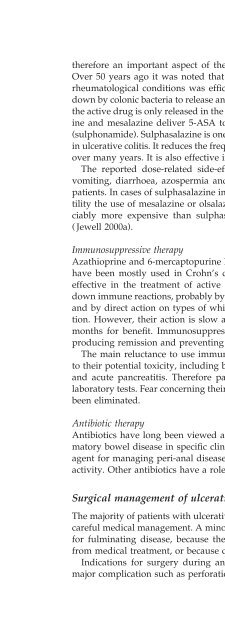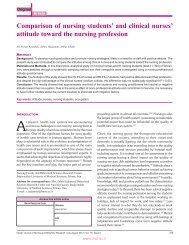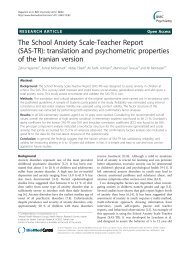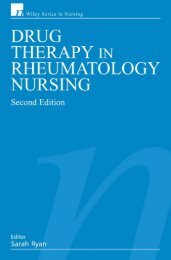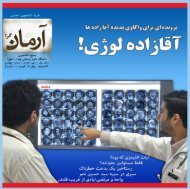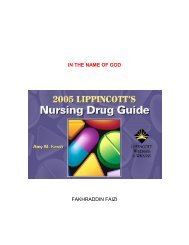Gastrointestinal Nursing.pdf
Gastrointestinal Nursing.pdf
Gastrointestinal Nursing.pdf
You also want an ePaper? Increase the reach of your titles
YUMPU automatically turns print PDFs into web optimized ePapers that Google loves.
The Large Intestine 89therefore an important aspect of the long-term management (Jewell 2000a).Over 50 years ago it was noted that the medication, sulphasalazine, used inrheumatological conditions was efficacious in IBD. Sulphasalazine is brokendown by colonic bacteria to release an active component, 5-ASA. Consequently,the active drug is only released in the colon. Newer compounds such as osalazineand mesalazine deliver 5-ASA to the colon without the carrier molecule(sulphonamide). Sulphasalazine is one of the mainstays of maintenance therapyin ulcerative colitis. It reduces the frequency of recurrent attacks and is effectiveover many years. It is also effective in the treatment of mildly active disease.The reported dose-related side-effects of sulphasalazine include nausea,vomiting, diarrhoea, azospermia and headaches and occur in up to 20% ofpatients. In cases of sulphasalazine intolerance, hypersensitivity or male infertilitythe use of mesalazine or olsalazine is indicated. These drugs are appreciablymore expensive than sulphasalazine, but are much better tolerated( Jewell 2000a).Immunosuppressive therapyAzathioprine and 6-mercaptopurine have been used extensively in IBD. Theyhave been mostly used in Crohn’s disease but have also been shown to beeffective in the treatment of active ulcerative colitis. They act by dampingdown immune reactions, probably by indirectly blocking the synthesis of DNAand by direct action on types of white blood cells associated with inflammation.However, their action is slow and they have to be taken for over threemonths for benefit. Immunosuppresive therapies are particularly helpful inproducing remission and preventing relapse in IBD.The main reluctance to use immunosuppressive drugs is primarily relatedto their potential toxicity, including bone marrow suppression, hepatotoxicityand acute pancreatitis. Therefore patients must be closely monitored usinglaboratory tests. Fear concerning their mutogenic and teratogenic potential hasbeen eliminated.Antibiotic therapyAntibiotics have long been viewed as a potential treatment option in inflammatorybowel disease in specific clinical situations. Metronidazole is a usefulagent for managing peri-anal disease and may also suppress Crohn’s diseaseactivity. Other antibiotics have a role in treating septic complications.Surgical management of ulcerative colitisThe majority of patients with ulcerative colitis can be successfully managed bycareful medical management. A minority still require surgical treatment eitherfor fulminating disease, because they are unresponsive or have side-effectsfrom medical treatment, or because quality of life is poor.Indications for surgery during an acute attack include the presence of amajor complication such as perforation or acute dilatation, failure to improve


